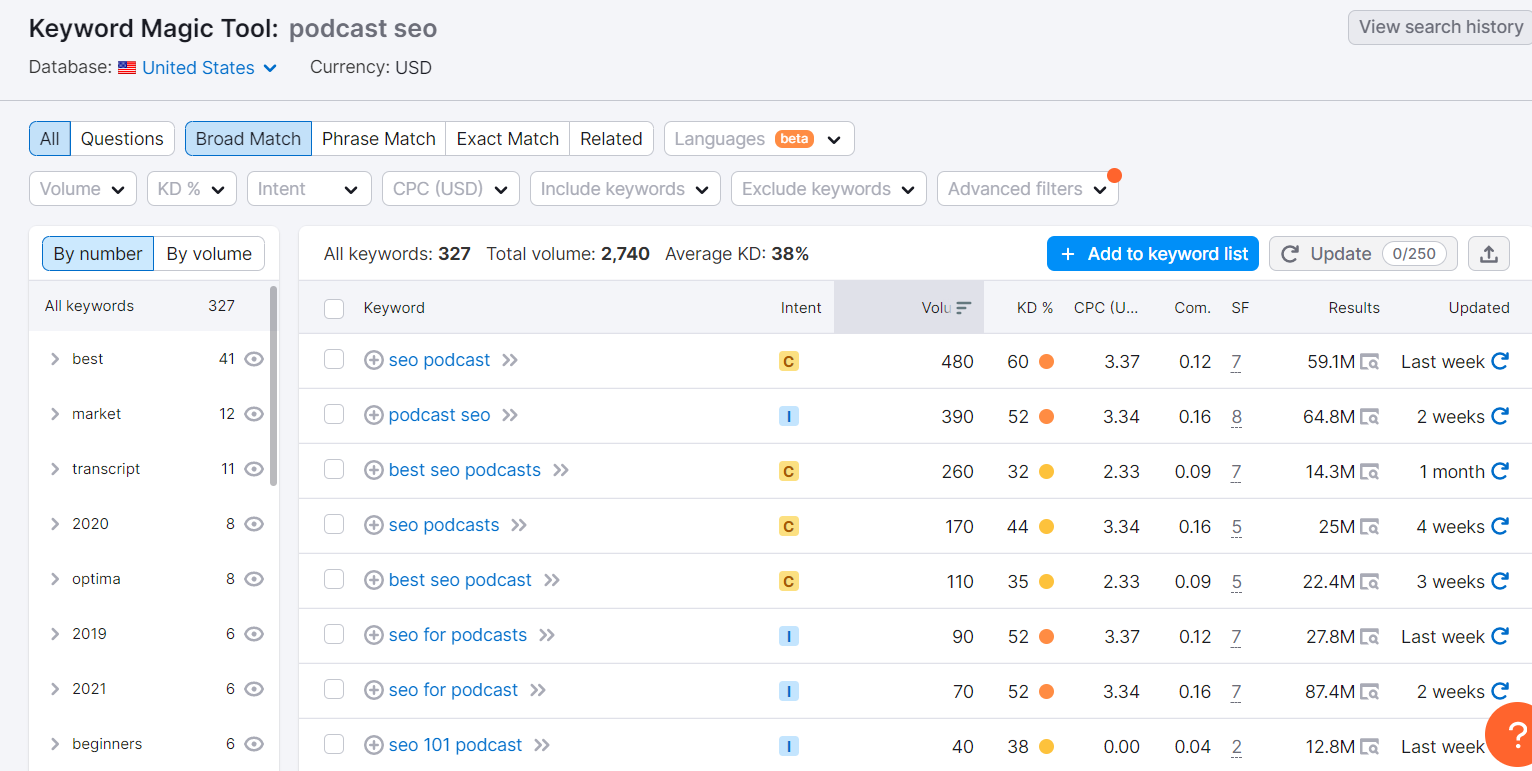Beginners Guide to Keyword Research
This page may contain affiliate links. If you purchase using one of these affiliate links, I make a small commission at no additional cost to you. Thank you for supporting my small business!
Have you ever felt stuck trying to boost your website visibility? You're not alone. Many small business owners struggle to attract traffic and increase visibility online. However, the key lies in understanding and mastering keyword research.
But where do you start with keyword research? How do you find the golden keywords that will shoot your site to the top of search engine results? In this beginner's guide, we'll go through the primary steps of keyword research, ensuring you have the tools and expertise to improve the performance of your website.
Let's dive in!
Understanding Keyword Research
Keyword research is a foundational component of SEO, guiding how content should be created to meet audience needs. It involves identifying words and phrases potential customers use in search engines.
This process is not just about finding high-volume terms; it's about understanding the intent behind searches. Businesses can design their content by analyzing these terms, ensuring it aligns with what their audience is looking for.
Effective keyword research bridges the gap between the language of the business and its target audience, laying a foundation for enhanced visibility and engagement with the target audience.
Getting Started with Keyword Research
Are you planning to start keyword research? Here are the initial steps you should follow:
Step 1: Brainstorming
Start with brainstorming keywords. Jot down terms that capture your business's essence. Think about what your audience might search for. Are they seeking solutions, information, or specific products? Your list shouldn't just include obvious terms. Dive deeper. Consider variations and related concepts.
Let’s say you have a gift packaging business. Start by entering your main word, “gift packaging.” Consider what your potential customers might search for, considering recent events like “Christmas gift packaging ideas.” Expand your list to include “luxury gift packaging ideas” or “personalized gift packaging ideas.”
By following this process, you create a well-rounded list of keywords catering to various aspects of your gift-wrapping business and your potential customers' diverse needs and interests.
Step 2: Google Insights
Next, use Google's autocomplete. It's a goldmine. Start typing a term and watch as Google suggests popular searches. These are not just random searches, but they're what real people frequently look for. Note which terms pop up. They're invaluable clues about what your audience wants to know.
Let’s look at the gift packaging business example. Here’s a photo of the most popular searches people in your target area are typing.
Don't overlook the "People Also Ask" section underneath, once you complete a search. Here, you’ll see questions real users have frequently asked, related to your terms. These questions can guide your content creation process, ensuring it resonates with your audience's needs and curiosities.
Combining your brainstormed ideas with Google's insights sets a solid foundation for your keyword strategy.
Using Tools for Keyword Research
Apart from these traditional techniques, you can level up your game by using SEO-specific tools for keyword research.
Google Keyword Planner: A Starting Point
Google Keyword Planner stands out as a primary tool for beginners in keyword research. It's part of Google Ads but is free to use. You can discover new keywords related to your business and see estimates of the searches they receive and the competition level.
What makes it unique is its direct data from Google's search engine, providing reliable and relevant insights.
SEMRUSH
The keyword tool I use and highly recommend is Semrush. It makes keyword research easy by finding relevant topics, generating optimized keywords, and storing them for you in its Keyword Manager. Click here to try Semrush yourself!
Keyword Surfer
Keyword Surfer, a browser extension, offers another approach. It shows keyword data directly in your Google search results. This includes similar search queries and estimated traffic for each term.
The benefit? You gain instant insights as you naturally browse the web, making it an excellent tool for brainstorming and discovering long-tail keywords.
Utilizing Tools Effectively
To effectively use these tools, start by entering a basic keyword related to your niche in Google Keyword Planner. Analyze the suggested keywords, focusing on those with a high search volume but lower competition.
You can take that strategy over to Semrush, as well as pulling keywords the tool recommends for you. The data the Keyword Magic Tool provides will help you make an informed decision on which keywords to use.
With Keyword Surfer, observe the suggestions during regular searches. This helps identify trends and variations in search queries, guiding you to refine your keyword selection process.
By leveraging these tools, you can enhance your website's visibility, driving more traffic and engagement.
Selecting the Right Keywords
After searching for the keywords, now its time to select the right ones for your website.
Choosing Keywords for Web Pages
Picking the right words is like finding keys to a treasure. Every page on your website is unique, like a puzzle piece. Think about what each page offers. Is it about a product? A service? Or maybe it’s your blog. Imagine what words your customers might use to find that specific page. These words should act as your keywords for those pages.
The Power of Long-Tail Keywords
Sometimes, it's not just about short, catchy words. Long-tail keywords are like secret passages to more traffic. They're longer phrases, like “customized gift wrapping services for birthdays” instead of just “gift packaging.”
These phrases are specific. They might not be searched as much, but when they are, they're exactly what some people want. This precision can be a game-changer in your content strategy.
Strategic Placement of Keywords
Once you are done with selecting the right keywords, now it's time to integrate them into your content. You just cannot place them anywhere. There are some strategic placements of keywords to make your site more SEO-friendly and more visible to your target audience.
1. Headings and Body Text
Your main keywords should shine in headings and subheadings. This grabs attention! In the body, sprinkle them naturally. It's like adding salt to a dish, just enough to taste great.
2. Alt Text and Meta Descriptions
Alt text in images is a hidden gem. Describe the image and slip in a keyword. Click here to read a blog post all about how to optimize your images for SEO. Meta descriptions, those little snippets under search results, are crucial. They should be catchy, using your keyword to hook readers.
Pro tip: Here's the trick: don't overdo it. Keywords are important, but too many? Google notices if you’re trying to force a bunch of keywords in a post or on a page, and it won’t help your ranking. Always sound like a human being, not a robot. Aim for a natural, conversational tone, and keep it simple and engaging. Your readers and search engines will thank you!
Monitoring and Adjusting Keywords
Here comes the most important part- monitoring and adjusting keywords.
Tracking Website Performance
To keep your keyword strategy effective, regularly monitor your website's performance. Use atool like Google Analytics to see how visitors find your site and which keywords they use. This insight helps you understand what's working.
Evolving Your Keyword Strategy
Based on analytics, tweak your keywords. If certain terms bring more traffic, focus on them. Drop underperforming keywords. Remember, SEO isn't a one-time task. It's a dynamic process. Keep adapting to stay ahead.
This approach ensures your website stays relevant and ranks well in search results. Keep it simple: monitor, analyze, adapt.
Conclusion
In conclusion, mastering keyword research is the foundation of SEO success. It's a journey of learning and adapting, vital for boosting your online visibility. Start small, use the tools available, and stay curious about evolving trends.
Remember, the right keywords can significantly elevate your content's reach. Keep exploring, and don't hesitate to refine your strategy as you grow. Your dedication to keyword research will pave the way for your website's success.
Need some help with your visibility and SEO strategy? Click here to learn more about my SEO audits. Let's get started on optimizing your success together.
Pin this for Later:
Browse the Blog:












